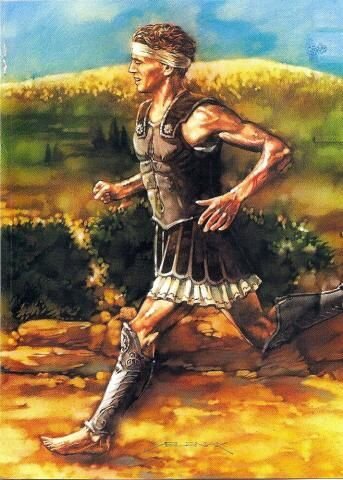What is the Significance of the Marathon in Greek History?
The significance of the Marathon in Greek history lies in its role as a symbol of valor and endurance. The Marathon is an iconic event that commemorates the legendary run of the soldier Pheidippides from the battlefield of Marathon to Athens to announce the victory over the Persians, before collapsing from exhaustion and delivering the message “We have won.”
This historic event has since inspired the modern marathon race, becoming a timeless testament to the indomitable human spirit and the pursuit of triumph over adversity. The Marathon continues to be celebrated globally, symbolizing perseverance, determination, and the triumph of the human will, making it an enduring emblem of courage and resilience.
Origins Of The Marathon
The marathon is a renowned event in Greek history that continues to captivate the world today. The origins of the marathon can be traced back to both legendary and historical accounts, each with their own fascinating stories. Delving into these origins allows us to understand the significance and enduring legacy of this iconic race.
Legendary Origins
In Greek mythology, the marathon can be traced back to a legendary story involving a messenger named Pheidippides. According to popular belief, during the Battle of Marathon in 490 BC, Pheidippides ran from the city of Marathon to Athens to announce the Greek victory over the Persians. He covered a distance of approximately 42 kilometers in one breathless sprint, delivering the momentous news to the eager Athenians.
This heroic feat is said to have inspired the modern marathon race, which covers a similar distance. The legend of Pheidippides has become deeply intertwined with the marathon, symbolizing courage, determination, and the endurance of the human spirit.
Historical Origins
In addition to the legendary origins, historical accounts of the marathon also shed light on its significance in Greek history. The historical origins of the marathon can be traced back to the Panhellenic Games, which were the most prestigious athletic competitions in ancient Greece. These games, held every four years, attracted athletes from various Greek city-states who vied for glory and honor.
One of the most notable events in the Panhellenic Games was the race from the city of Marathon to the sanctuary of the god Zeus in Olympia. This race, known as the “stadion,” covered a distance of approximately 192 meters. It served as a tribute to the messenger Pheidippides and was seen as a symbolic reenactment of his legendary run. The stadion race marked the beginning of the larger Panhellenic Games, emphasizing the significance of the marathon throughout Greek history.
Over time, the stadion race evolved into longer-distance races, including the diaulos (twice the distance of the stadion) and the dolichos (ranging from 7 to 24 laps around the stadium). These races showcased the endurance and physical prowess of the athletes, and their popularity continued to grow.
It was not until the modern Olympic Games were revived in Athens in 1896 that the length of the marathon race was standardized to approximately 42 kilometers. This decision was made to commemorate the legendary run of Pheidippides and to showcase the enduring spirit of the ancient Greeks. Since then, the marathon has become synonymous with endurance, determination, and the pursuit of excellence.
Understanding the origins of the marathon allows us to appreciate the deep-rooted significance of this event in Greek history. Whether rooted in legend or history, the marathon continues to inspire and challenge individuals from all walks of life, embodying the relentless pursuit of goals and the triumph of the human spirit.

Credit: en.wikipedia.org
The Battle Of Marathon
The Battle of Marathon holds immense significance in Greek history as it marked a pivotal moment in the conflict between Greece and Persia. The Greek victory at Marathon in 490 BC demonstrated the power of unity and strategic military tactics, shaping the course of Western civilization.
The Battle of Marathon was a pivotal event in Greek history, showcasing the determination and valor of the Athenians against the Persian invasion. This historic battle had far-reaching significance, shaping the course of Western civilization and leaving a lasting imprint on military tactics and strategy.Events Leading To The Battle
The Persian invasion of Greece in 490 BC culminated in the Battle of Marathon. Darius I, the Persian King, sought to punish Athens for their support of Greek Ionian revolts against Persian rule. In response, the Athenians and their allies rallied to defend their land. The series of events leading up to the battle unfolded as a testament to the Greeks’ unity and resolve.Strategies And Outcomes
As the Persian forces landed at Marathon, the Athenians, led by generals Miltiades and Callimachus, devised a bold strategy. They cunningly maneuvered their troops, utilizing their knowledge of the terrain to gain an advantage. The Athenians’ precise coordination and swift attack caught the Persians off guard, resulting in a remarkable victory. The outcome of the Battle of Marathon marked a turning point, instilling confidence in the Greek city-states and inspiring a newfound spirit of independence. “`Impact On Greek Society
The Marathon holds great significance in Greek history, symbolizing determination, heroism, and national pride. The iconic race serves as a reminder of the legendary run by Pheidippides, an Athenian messenger who delivered crucial news of victory at the Battle of Marathon.
This event has left an indelible impact on Greek society, inspiring athleticism and showcasing the resilience of the Greek people.
Impact on Greek Society Symbol of Patriotism The marathon holds a significant position in Greek society, symbolizing the essence of patriotism and national pride. The historic Battle of Marathon in 490 BC, where the Greeks achieved a decisive victory against the Persians, is still revered as a testament to Greek determination and resilience. Inspiration for Future Generations Through the legacy of the marathon, the heroic tale of the Athenian messenger Pheidippides, who ran from Marathon to Athens to announce the victory, continues to inspire future generations. The enduring spirit and dedication exhibited by Pheidippides have been immortalized in Greek culture, serving as a symbol of endurance and tenacity. As a result, the marathon has become deeply entrenched in the fabric of Greek society, serving as a reminder of the nation’s historical triumphs and the virtues of courage and perseverance. Additionally, the race has evolved into a global phenomenon, influencing athletic events and inspiring individuals worldwide. The marathon’s association with patriotism and the enduring legacy of Pheidippides has enshrined its significance in Greek history, leaving an indelible mark on society and fostering a sense of national pride and unity.
Credit: en.wikipedia.org
Modern Interpretation Of The Marathon
The marathon holds great significance in Greek history, symbolizing endurance and heroism. Its modern interpretation reflects the enduring spirit of ancient Greece, showcasing athleticism as a test of physical and mental strength. The marathon’s legacy continues to inspire individuals worldwide, transcending borders and uniting cultures through the universal language of sport.
Marathons As Sports Events
The modern interpretation of the marathon has transformed it into one of the most celebrated sports events worldwide. Marathons are organized in various cities, attracting participants from different walks of life. These events showcase the spirit of endurance, pushing athletes to overcome physical and mental limitations in pursuit of their goals.
Participating in a marathon is not only about winning but also about challenging oneself, setting personal records, and accomplishing the seemingly impossible. Runners from all backgrounds unite on the marathon route, sharing the common goal of overcoming the grueling distance and reaching the finish line.
Celebrating The Spirit Of Endurance
Marathons have become symbolic of the human spirit’s ability to prevail against adversity, reflecting the historical significance of the original Greek marathon. These events celebrate determination, resilience, and perseverance, embodying the values that shaped ancient Greek society.
The sight of thousands of participants preparing for the marathon, each engulfed in an aura of anticipation, stirs emotions and inspires onlookers. The collective display of bravery and tenacity reminds us of the triumphs and struggles of the past, igniting a sense of unity and community spirit.
It is through marathons that people continue to pay tribute to the legendary Greek soldier Pheidippides, who ran from Marathon to Athens to deliver the news of victory. The legacy of his heroic feat lives on as runners push their limits, striving to complete the arduous distance with every step.
A Testament To Human Endurance
Marathons that take place in major cities around the world serve as a testament to the indomitable spirit and resolve of the human race. These events capture the imagination of millions, inspiring even those who may never participate.
The marathon is not just a race; it represents the journey of life itself. It teaches us that persistence, determination, and embracing challenges are key to personal growth and achieving success. Through the marathon experience, people discover their inner strength, realizing that they are capable of surpassing their own expectations.
Whether it’s a small local run or a renowned international marathon, the significance of this ancient Greek tradition lives on through modern interpretation. As long as people continue to seek self-improvement, challenge their limits, and celebrate the spirit of endurance, the marathon will remain an enduring symbol of human accomplishment.
Evolution Of The Marathon Tradition
As the marathon tradition evolved, it became a global phenomenon, transcending boundaries and inspiring runners worldwide.
Globalization Of Marathons
Marathons have spread across the globe, attracting participants from diverse cultures and backgrounds.
Challenges And Innovations
Marathons have embraced technology and unique course designs to enhance the running experience.

Credit: study.com
Frequently Asked Questions Of What Is The Significance Of The Marathon In Greek History
What Is Marathon What Is Its Historical Significance?
Marathon is a long-distance running event, typically 26. 2 miles. Its historical significance lies in the Ancient Greek messenger who ran from Marathon to Athens to announce victory. This event inspired the modern marathon race.
What Was The Significance Of Marathon Greece?
Marathon Greece holds historical significance as it was the site of the famous Battle of Marathon in 490 BC, where the Greeks defeated the Persians. This victory boosted Greek morale and marked a turning point in the Persian Wars. The marathon race also originated here in commemoration of the messenger who ran from Marathon to Athens to deliver the news of the victory.
What Does The Marathon Race Have To Do With Ancient Greece?
The Marathon race originated in ancient Greece to commemorate a soldier’s run to Athens.
Conclusion
The marathon holds immense significance in Greek history, serving as a symbol of determination, bravery, and unity. Its origins may be traced back to the legendary story of Pheidippides, whose heroic run cemented its place as a testament to the human spirit.
Today, the marathon continues to inspire athletes worldwide, underscoring the lasting impact of this ancient Greek tradition. Embracing its rich history, we honor the legacy of the marathon and celebrate the indomitable willpower it represents.







